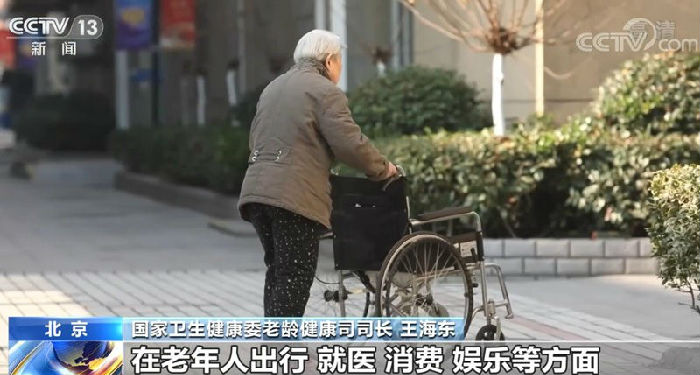



Source: <https://politics.gmw.cn/2022-10/25/content_36112826.htm>
Every year, October is the national month of respect for the elderly. By the end of 2021, the population of elderly for over 60 years old will reach 267 million in China. And China will enter the stage of moderate aging from mild aging during the Fourteenth-Five-Year-Plan period.
More than 90% of the elderly in China live at home or rely on the community for the care. During the Fourteenth-Five-Year-Plan period,China will build a 15-Minute Elderly Care Service Circle, and improve the care service system coordinated by homes, communities and institutions.
Wang Haidong, Director of the Department of Aging Health of the National Health Commission, said that we should vigorously strengthen the supply of elderly care services at home and in communities and build a15-Minute Elderly Care Service Circle. We plan to build 1000 national demonstration communities of elderly friendly every year during the Fourteenth-Five-Year-Plan period, provide all-round support in the elderly travel, medical treatment, consumption and entertainment, and fully implement the elderly care services project to offer real benefits for the elderly.
During the Fourteenth-Five-Year-Plan period, China will support communities and institutions to provide training and taking-a-break services for disabled elderly families, through organizing and coordinating volunteers to provide care services for disabled elderly at home. Social forces are encouraged to use community supporting or idle housing to set up nursing stations, providing home health services for the disabled elderly. Community health service centers are encouraged to cooperate with relevant institutions to provide short-term care, temporary care and other services for the elderly at home. Nursing beds or nursing units are added or set up at community health service centers, township health centers and other grassroots medical and health institutions where conditions permit. The action of improving the ability of combining medical care with nursing care is implemented in the community. Medical and nursing institutions are supported to provide care services for the disabled elderly with extending care services to communities and families. The combination of Internet plus+health care and Internet plus+nursing services is promoted to provide convenient home care services for the elderly through innovation.
Community elderly care: caring service
In recent years, the community elderly care service facilities are increasingly accelerated to further constantly meet the needs of elderly people for meal delivery, medical rehabilitation, life care, etc., and so that the elderly can enjoy intimate and thoughtful elderly care services at home.
To enable the elderly enjoy nearby services , not to leaving their familiar communities, such as meal aid and short-term care, Chaoyang District in Beijing, has built 170 elderly care service stations during the past five years, mainly providing respite care or staged care. The elderly can come or go freely between the elderly care stations and their families. If the elderly is in good health or his family can take care of him, he can go home at any time. At Xiangrong Elderly Care Service Station in the street of the Asian Games Village, nurses are teaching the elderly to practice aerobics. And now there are 40 beds , and more than 200 elderly have come to receive services.
Li Wenyu (88 years old), an old man living at Xiangrong Elderly Care Service Station in the Yayun Village Street, Chaoyang District: My wife is suffering from some physical problems. He needs help getting up and getting dressed. We can't solve it ourselves. It's near and convenient to come here.
Wang Jingzhao (87 years old), an old man living at Xiangrong Elderly Care Service Station in the Yayun Village Street, Chaoyang District: My home is very close to here and also to the original unit, so it is very close to reimburse medical expenses or go home to see the children.
In order to provide the ready meals for the rural elderly, Zhuji City, Zhejiang Province has opened 144 love canteens since the last year, covering 217 villages and communities.
Wang Weikang, a villager in Xinsheng Village, Paitou Town, Zhuji City: the dishes in our Love Canteen are well matched, delicious and nutritious. In the future, we seniors will no longer have to worry about cooking.
For some elderly people with mobility difficulties, volunteers will also provide door-to-door service. The Love Canteen adopts the operation mode of government subsidy, individual contribution and fund donation. The elderly only pay three to five yuan for each meal according to their age.
Workers of elderly care : a good helper for disabled elderly families
There are about 40 million disabled and partially disabled elderly people in China. Most of them live at home and need daily care and nursing services to varying degrees.
In recent years, more and more workers of elderly care have entered the family to provide services for these elderly people.
Chen Fujing, a resident of Shijingshan District in Beijing, has been in bed for seven years because of severe disability, caused by cerebral infarction seven years ago. In May last year, he applied for long-term care insurance and received a subsidy of 1044 yuan per month, as well as four home visits by workers of elderly care.
Wang Yongcai, a worker of elderly care: Four times a month, three hours at a time. For example, hair and feet cleaning. This uncle has leg cramps after cerebral infarction. The cramps are very painful. Like it’s rainy yesterday, it hurts very much today. He needs massaging from top to bottom and it’s relieving from where you press it.
"If one person is disabled, the whole family is out of balance". Turning over, taking a bath and getting a haircut are seemingly simple things, but they are difficult problems for Chen Fujing and his wife, Ms. Meng has been in bed for a long time. She said that she did not know what to do when she saw her husband suffering from physical torture. Her heart ached with her husband. Now that there are elderly care attendants coming to serve her, the pressure is much reduced.
Meng Qiuhua, wife of the disabled elderly Chen Fujing: His pain is like that of myself. But I can't help it, so I especially hope that he will come. He will knead him as soon as he comes. I feel much more relaxed. At least I can rest for several hours during the day. After finishing the long term insurance, I know that the it is so good at protecting the insurance and solving the family economic difficulties. Later, someone will help me. I said that my husband is saved.
Chen Fujing's wife said that because she did not know how to operate, her husband did not take a bath after he was paralyzed. Only when Wang Yongcai, the worker of elderly care, came to the house with professional equipment, did she really solve the problem of her husband's bath. While taking care of Chen Fujing, Wang Yongcai also taught Ms. Meng some nursing skills.
Wang Yongcai, 51, came to Beijing from Heilongjiang rural areas in 2019 and worked in a nursing home after professional training. Now he earns 7000 to 8000 yuan a month. Wang Yongcai said that in this business, we should not only be energetic, but also careful; It requires not only professional skills, but also humanistic care to enable the elderly to recover physically and mentally.
Cities are accelerating the training for workers in elderly care service
It is estimated that there is a gap of about 5 million elderly care workers in China. In recent years, various measures have been taken to speed up the training of elderly care nurses.
In recent years, Enyang District of Bazhong City in Sichuan Province has vigorously carried out targeted and order based skills training for elderly care nurses. At present, more than 2000 workers have been trained, which not only alleviates the shortage of elderly care institutions, but also promotes the employment of urban and rural workers. During this period, more than 40 trained and qualified elderly care workers took up new jobs.
Tan Xiaoying, a worker of elderly care : I am very satisfied that at my age, I can get a salary of 5000 to 6000 yuan a month through skills training.
Starting from 2021, Beijing will award new graduates, who enter the elderly care service industry, in three years, including 60,000 yuan for undergraduates and above, 50,000 yuan for junior colleges and higher vocational schools, and 40,000 yuan for secondary vocational schools. In combination with their professional skill levels, the employees in the elderly care will be directly granted subsidies ranging from 500 yuan to 1500 yuan.
Yangpu District of Shanghai takes the lead in introducing elderly care workers as key talents to settle down in China. Not long ago, Wang Cheng, a 26 year old elderly care worker from Sichuan, received a new household registration book. Yangpu District stipulates that the elderly care talents introduced by the elderly care institutions can apply for household registration if they are awarded by the provincial and ministerial government or above, or won the National Skills Competition Award, the State Council's special allowance and other honors, or the elderly care institutions are included in the list of key support and support for the city's talent settlement policy.
The Guiding Opinions on Further Promoting the Development of Combination of Health Care and Nursing Care ,issued by the National Health Commission, the Ministry of Education and other departments, recently proposes to accelerate the training of talents of elderly care services, encourage ordinary universities and vocational colleges to add health and elderly care related majors and courses, expand the enrollment scale and meet the needs of the industry.
Source:http://www.planning.org.cn/news/view?id=13196&cid=12
Translated by: Yue Wang